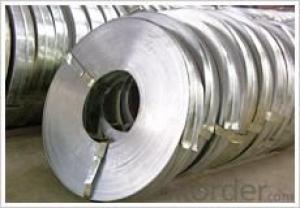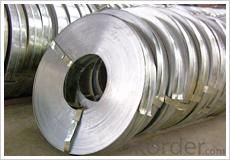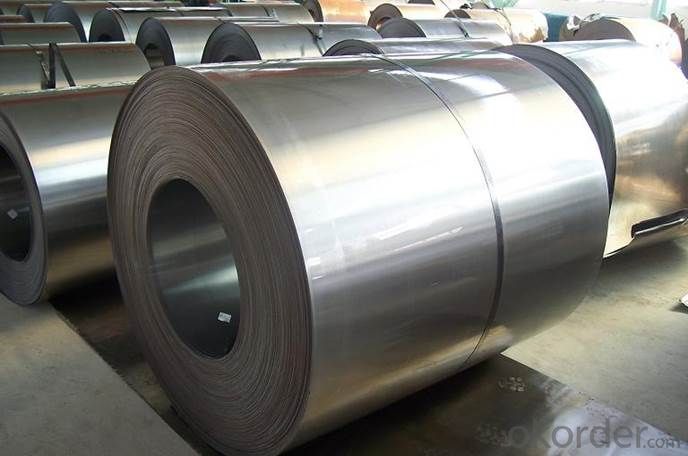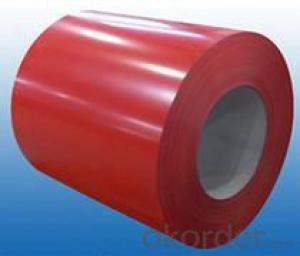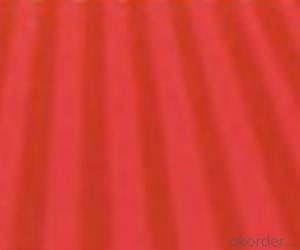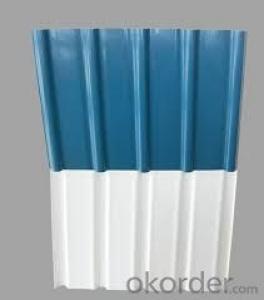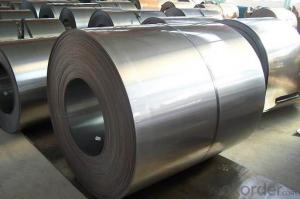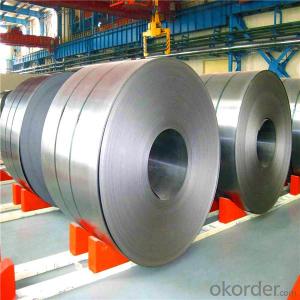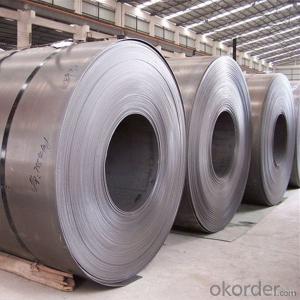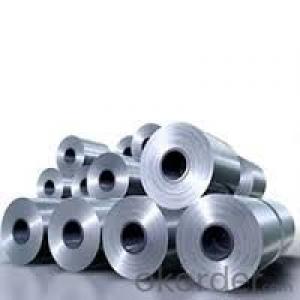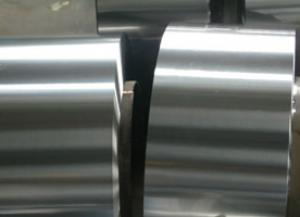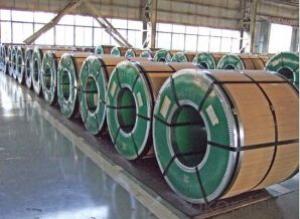Prime Cold Rolled Steel Coil
- Loading Port:
- China Main Port
- Payment Terms:
- TT OR LC
- Min Order Qty:
- -
- Supply Capability:
- -
OKorder Service Pledge
OKorder Financial Service
You Might Also Like
Specification
Product Name | Cold Rolled Sheet Coil |
Material | SPCC/SPCD/SPCE/DC01/ST12/ ST14/SPCD/DC03/DC04 ect. |
Grade Standard | JIS G3302, EN10142, ASTM653, ASTM95 |
Thickness | 0.15-3.5mm |
Width | 600mm-1500mm |
Coil ID | 508-610mm |
Coil OD | max 1500mm |
Weight | 3-10 Tons |
Tolerance | Thickness tolerance:+/-0.02mm; Width tolerance:+/-5mm |
Surface | No-skin passed or Skin passed, Tensile leveled |
Surface Treatment | Chromate/Unchromate passivation, fingerprint resistant treatment, oiled/unoiled |
Annual Output | 350,000MT |
Application | Construction, hardware, home applicances, interior decoration |
General Application of Cold Rolled Steel Coil:
Classification | Designation | Characteristics | Main applications |
Commercial quality | SPCC SPCCT | Commercial quality suitable for bending fabrication and simple forming; this is the type in greatest demand. | Refrigerators, cabinets, power distribution baords and drums. |
Drawing quality | SPCD | Drawing quality second only to that of SPCEN. Excellent uniformity. | Automobile floor and roof panels. |
Deep-drawing quality | SPCE SPCF | Deep-drawing quality.With metallurgically controlled grain size, it retains its beautiful finish even after being deep-drawn. | Automobile fenders and quarter panels |
Extra deep-drawing quality | SPCG | Extra-low-carbon steel sheets with highest workability | Automobile internal panels and deep-drawn parts |
- Q: Q235 is hot rolled steel or cold rolled steel?
- Q235 hot rolling and cold rolling are available, depending on availabilityThe need for heating the material before hot rolling, rolling process or rolling, usually heated to above the recrystallization temperature, such as more than 1000 degrees; cold rolling is the process does not require heating of the material, or the material is heated to the temperature below the recrystallization.
- Q: Are steel sheets suitable for automotive body panels?
- Yes, steel sheets are suitable for automotive body panels. They provide excellent strength, durability, and crash-resistance, making them a popular choice in the automotive industry. Additionally, steel sheets are cost-effective and easily customizable, making them an ideal material for automotive body panels.
- Q: Are the steel sheets suitable for high-temperature applications?
- Yes, steel sheets are suitable for high-temperature applications due to their excellent heat resistance and strength.
- Q: Can steel sheets be used for water tanks or reservoirs?
- Yes, steel sheets can be used for water tanks or reservoirs. Steel is a durable and strong material that is commonly used for constructing water tanks due to its ability to withstand high pressure and resist corrosion. Additionally, steel tanks can be easily fabricated and customized to meet specific size and capacity requirements. However, proper coating and maintenance are necessary to prevent rusting and ensure the longevity of the tank.
- Q: What are the different sheet metal folding techniques for steel sheets?
- Steel sheets can be subjected to various sheet metal folding techniques. These techniques find extensive application in industries like automotive, aerospace, and construction for creating intricate shapes and structures. Some frequently used sheet metal folding techniques for steel sheets comprise: 1. Box and Pan Folding: This technique entails bending the sheet metal along multiple parallel edges to form a box-shaped structure. It is commonly utilized for manufacturing enclosures, cabinets, and trays. 2. Hemming: Hemming is employed to fold the edges of a sheet metal component, enhancing its rigidity and eliminating sharp edges. It finds prominent usage in the automotive sector for fabricating panels and body parts. 3. Brake Press Folding: Brake press, a machine tool utilizing hydraulic or mechanical press, is employed to bend the sheet metal. Precise and accurate folding is facilitated by adjusting the bend's angle and depth. Brake press folding is a frequently employed technique in sheet metal fabrication. 4. Roll Forming: Roll forming is a continuous bending process wherein the sheet metal passes through a series of rollers, gradually shaping it into the desired profile. It is suitable for creating elongated and continuous shapes like tubes and channels. 5. Rotary Folding: In this technique, a rotating tool is utilized to fold the sheet metal along a curved or circular path. It is often applied to create rounded edges, curves, and cylindrical shapes. 6. Folding Machines: Folding machines are specifically designed to fold sheet metal by applying pressure along a predetermined line. These machines can be programmed to carry out various folding operations, including simple bends, complex shapes, and multiple folds. Each of these sheet metal folding techniques possesses its own advantages and limitations. The selection of a particular technique depends on factors such as the design's complexity, required precision, and production volume. Skilled craftsmen and specialized machinery are frequently employed to ensure accurate and efficient folding of steel sheets.
- Q: What is the difference between a hot rolled and hot dipped galvanized steel sheet?
- A hot rolled steel sheet is produced by rolling the steel at high temperatures, typically above 1,000 degrees Fahrenheit. This process allows the steel to be shaped and formed easily, resulting in a sheet with a rougher and less precise surface finish. Hot rolled steel sheets are commonly used in applications where strength and durability are key factors, such as in construction and structural projects. On the other hand, a hot dipped galvanized steel sheet goes through an additional process after being hot rolled. The steel sheet is immersed in a bath of molten zinc, which creates a protective coating on the surface of the steel. This coating provides excellent corrosion resistance and helps to prevent rusting, making hot dipped galvanized steel sheets ideal for outdoor and exposed applications. The main difference between the two types of steel sheets lies in their surface finish and protective properties. While hot rolled steel sheets have a rougher surface, hot dipped galvanized steel sheets have a smoother and more uniform appearance due to the zinc coating. Additionally, the galvanization process provides enhanced corrosion protection to the steel, extending its lifespan and making it suitable for harsh environments. In summary, hot rolled steel sheets are versatile and commonly used in various applications, while hot dipped galvanized steel sheets offer added protection against corrosion and are often preferred for outdoor or exposed applications.
- Q: Do steel sheets have any magnetic properties?
- Yes, steel sheets do have magnetic properties. Steel is an alloy composed primarily of iron, carbon, and other elements, and it is known to be ferromagnetic. This means that it can be magnetized and attracts magnets. However, the degree of magnetism in steel can vary depending on its composition and processing. Some steel alloys can be easily magnetized and retain their magnetism even after the applied magnetic field is removed, while others may have lower magnetic properties. The presence of impurities and the specific heat treatment process can also affect the magnetic properties of steel. Overall, steel sheets can exhibit magnetic properties, but the degree of magnetism may vary depending on the specific type and composition of the steel.
- Q: Are the steel sheets suitable for high-temperature applications?
- Steel sheets are generally considered suitable for applications with high temperatures. Steel is renowned for its exceptional strength and durability, making it a favored choice among various industries that require materials capable of withstanding extreme heat. Steel sheets can be produced with high melting points and can maintain their structural integrity even when exposed to intense heat. Moreover, steel exhibits commendable thermal conductivity, enabling efficient heat dissipation from the surface. However, it is crucial to take into account the particular grade and composition of the steel sheets, as certain alloys are specifically engineered for high-temperature applications. It is advisable to seek advice from a materials engineer or specialist to ensure that the chosen steel sheets are appropriate for the specific high-temperature environment.
- Q: Can steel sheets be bent or formed into different shapes?
- Yes, steel sheets can be bent or formed into different shapes through processes such as cold or hot rolling, stamping, or press braking.
- Q: Can steel sheets be used for modular furniture?
- Yes, steel sheets can be used for modular furniture. Steel is a strong and durable material that can be easily shaped and manipulated, making it suitable for creating various modular furniture pieces such as shelves, tables, or cabinets. Additionally, steel sheets offer a sleek and modern aesthetic, making them a popular choice for contemporary furniture designs.
Send your message to us
Prime Cold Rolled Steel Coil
- Loading Port:
- China Main Port
- Payment Terms:
- TT OR LC
- Min Order Qty:
- -
- Supply Capability:
- -
OKorder Service Pledge
OKorder Financial Service
Similar products
Hot products
Hot Searches
Related keywords
